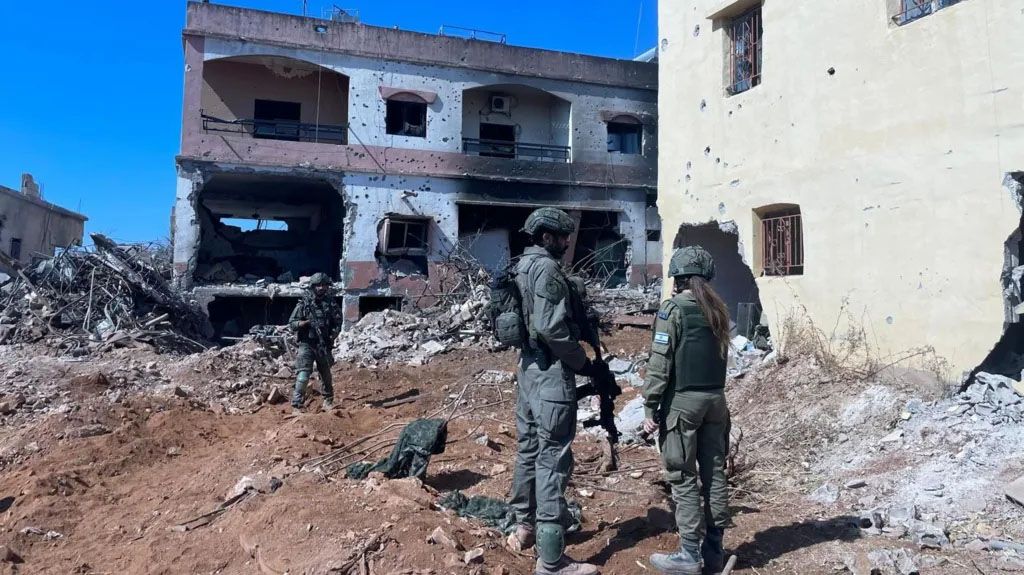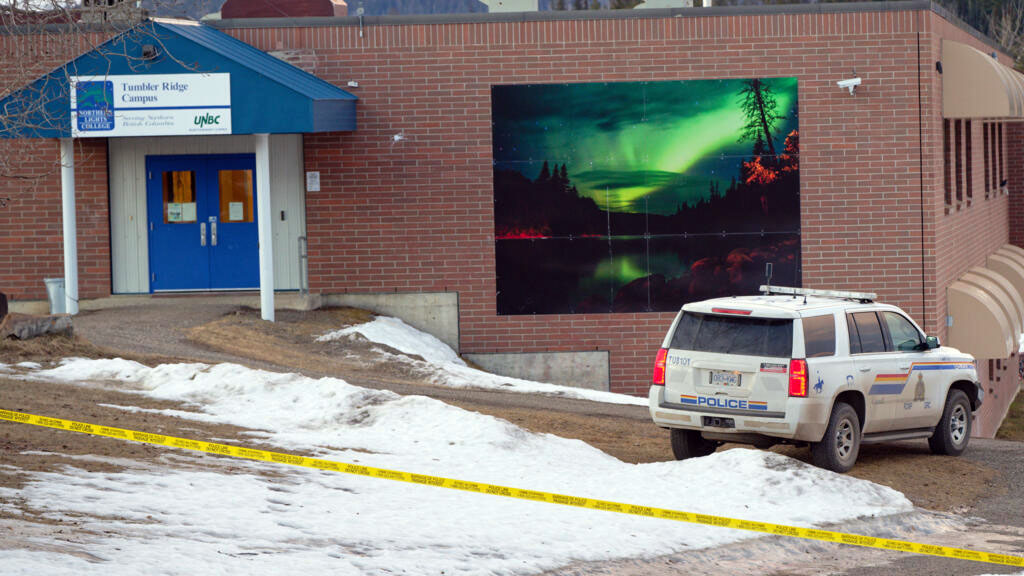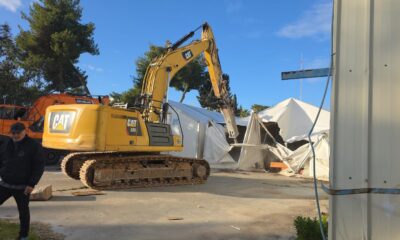International
Inside Israel’s combat zone in southern Lebanon

Inside Israel’s combat zone in southern Lebanon
Israeli army vehicles had already pounded the dirt road into dust where we crossed into Lebanon, breaking through a hole in the fence that marks the ceasefire line drawn between the two countries a generation ago.
The ceasefire itself is already in tatters.
Israel’s ground invasion along this border last week was launched, it said, to destroy Hezbollah weapons and infrastructure in “limited, localised, targeted raids”.
Ten days on, the army was taking us to a village a couple of miles into Lebanese territory, where it had just established “some level of control”.
We were told not to reveal where it is, for military reasons, and our movements were restricted.
Israeli artillery was blasting through the air as we arrived. The brigade commander, Col Yaniv Malka, told us the area was still not clear of Hezbollah fighters.
Bursts of small-arms fire were from fighting that was taking place 500m away, he said, describing “face-to-face combat” with Hezbollah fighters inside the village just a couple of days before – meaning, he said, “my troops seeing in their eyes, and fighting them in the streets”.
All along the central path through the village, houses lay demolished; piles of rubble leaching glimpses of family life. Buildings left standing were shot through with artillery, missing corners or walls and peppered with gunshot and shrapnel holes.
Two tanks sat in churned up earth near what was once a village square. The level of destruction around them is reminiscent of Gaza.
Our movements on the ground were restricted by the army to a limited area of the village, but neighbouring buildings and communities appeared, from a distance, to be untouched.
These incursions seem – so far – to be more “limited and targeted” geographically than militarily.
The graffiti on a building commandeered by troops read: “We wanted peace, you wanted war”.
READ ALSO:
- Ukrainian journalist, 27, who chronicled Russian occupation dies in prison
- Cleric predicts gang-up plot to unseat Senate President Akpabio
- Israeli strikes kill 29 people in Gaza, medics confirm
“Most of the terrorists ran away,” Col Malka told me. “[But] dozens of houses were booby-trapped. When we went house to house, we discovered booby-traps and weapons. We had no choice but to destroy them.”
We only have the army’s account of what happened here.
I asked an army spokesman whether any women or children were present when the operation here began. He replied that all civilians had been given ample warning to leave.
The human rights group Amnesty International this week described Israel’s evacuation warnings in southern Lebanon as inadequate and overly general, and said they did not absolve the country of its obligations under international law.
We were also shown three caches of weapons it said were found inside civilian homes here, including boxes of brand-new mortars, new anti-tank missiles and mines, as well as sophisticated shoulder launched rockets and night-scopes.
One anti-tank missile we saw was already semi-assembled.
The chief of staff for the 91st Division, Roy Russo, also showed us a garage he said had been used as an equipment warehouse, with sleeping bags, body armour, rifles and ammunition hidden in a large barrel.
“This is what we call an exchange zone,” he said. “They’re morphing from civilians into combatants. All this gear is designed to manoeuvre into [Israel] and conduct operations on the Israeli side. This is not defensive equipment.”
This, Israel says, is why it launched its invasion of southern Lebanon; that Hezbollah’s stockpiles of weapons and equipment along this border were planning for a cross-border attack similar to last year’s 7 October attacks by Hamas in southern Israel.
At the start of this invasion, the army revealed that Israeli special forces had been operating across the Lebanese border in small tactical units for almost a year, conducting more than 70 raids to find and destroy Hezbollah infrastructure, including underground tunnels – one of which, it said, stopped 30m (100ft) before the ceasefire line with Israel and was unfinished.
Col Malka showed me some of the weapons he said the army found on the day we arrived. They include a large IED, an anti-personnel mine, and a high-tech night-scope.
He said troops were finding “two to three times” the number of weapons they found in Gaza, with “thousands” of weapons and thousands of pieces of ammunition found in this village alone.
READ ALSO:
- Nigeria ranks 5th globally in food insecurity
- I will not challenge Edo election result – Olumide Akpata
- EFCC declares oil mogul Bolaji Akinduro wanted over fraud
“We don’t want to hold these places,” he told me. “We want to take all the ammunition and fighting equipment out. After that, we expect the people will come back, and understand that peace is better for them, and terrorist control over them in a bad thing.”
“But I’ll leave that to the diplomats to solve,” he smiled.
After the last ground war between Israel and Hezbollah in 2006, the UN ruled that Hezbollah must pull back north of the Litani River. A previous resolution also ordered its disarmament. Neither decision has been enforced.
That ground war in 2006 was a wake-up call for Israel. The Iran-backed militia fought its army to standstill. For almost 20 years, both sides have been avoiding – and preparing for – the next one.
Col Malka fought in Lebanon during that war. “This one is different,” he said.
When I asked why, he replied: “Because of 7th October.”
As we were speaking, the sound of small-arms fire grew louder. He gestured towards it. “That’s my guys fighting in the casbah,” he said.
Israel’s ground invasion is part of a dramatic escalation against Hezbollah over the past three weeks that has also seen it intensify air strikes on southern Lebanon and parts of Beirut.
Lebanon says more than 2,200 people have been killed, mainly during the recent escalation, and more than a million people displaced.
Hezbollah began firing rockets into northern Israel on 8 October last year, the day after Hamas’s deadly attack on southern Israel. The Iran-backed group says it is acting in solidarity with the Palestinians and has said it will stop firing if there is a ceasefire between Israel and Hamas in Gaza.
Israel accuses Hezbollah of using civilians as human shields. One commander described the ground war as an offensive operation to defend Israeli citizens – an invasion to stop an invasion, in other words.
But the speed with which Israel’s forces have been moving through villages along this border may only be the first chapter in this story.
Hezbollah tactics have shifted since the ground invasion began, with Israeli towns like Metula – surrounded on three sides by Lebanon – reporting a drop in direct fire from anti-tank missiles, and a rise in rockets fired out of sight from further away.
The assessment of many is that Hezbollah fighters have not run away, but simply withdrawn further back into Lebanon.
Israel already has four divisions lined up at this border – and a growing chorus of voices inside the country who say this is the moment, not just to push back Hezbollah, but to remake the Middle East.
As the fighting near the village intensified, we were told to leave immediately, hurried out to the waiting convoy.
Under the shadow of a growing conflict with Iran, Israel’s small successes along this frontier don’t change one key fact: this is not actually a border war, it’s a regional war being fought along a border.
Inside Israel’s combat zone in southern Lebanon
International
Trump Halts Minnesota Immigration Crackdown After Fatal Shootings, Protests

Trump Halts Minnesota Immigration Crackdown After Fatal Shootings, Protests
The Trump administration has officially halted Operation Metro Surge, a controversial immigration enforcement operation in Minnesota, following widespread protests, political backlash, and the deaths of two U.S. citizens. The decision was announced by Tom Homan, the U.S. “border czar,” who confirmed that President Donald Trump approved ending the monthslong crackdown.
Operation Metro Surge, launched in December 2025, focused on the Minneapolis–St. Paul metropolitan area, deploying nearly 3,000 federal immigration officers at its peak. The operation aimed to detain undocumented immigrants, which the Department of Homeland Security (DHS) described as targeting “criminal illegal aliens.” However, reports indicate that many detainees had no criminal records, including children and U.S. citizens, raising concerns about the operation’s scope and fairness.
- Army University Professor Dies in Boko Haram Captivity After Nearly One Year
- MURIC Calls Proposed US Sanctions on Nigerian Muslims ‘Lopsided’
- Supreme Court Affirms Muslim Students’ Right to Worship at Rivers State University
The crackdown drew intense public opposition after anti-ICE protesters Renée Good and Alex Pretti were fatally shot during separate incidents in Minneapolis. The shootings intensified calls for accountability and prompted local and national criticism of federal enforcement tactics.
In a statement, Homan said, “I have proposed and President Trump has concurred that this surge operation conclude.” He noted that a drawdown of federal personnel had already begun, with a smaller contingent remaining temporarily to transition operations and coordinate with local authorities.
During the operation, DHS reported over 4,000 arrests, though critics highlighted the disproportionate impact on communities and families, emphasizing the humanitarian and civil liberties concerns arising from the surge.
Minnesota officials, including Governor Tim Walz and Minneapolis Mayor Jacob Frey, welcomed the decision, calling the operation an overreach that harmed communities and strained trust between law enforcement and residents. Civil rights groups also praised the halt but urged comprehensive immigration reforms to prevent future abuses.
The end of Operation Metro Surge marks a significant development in the national debate over immigration enforcement, sanctuary policies, and federal authority, highlighting the challenge of balancing border security with human rights and community safety.
Trump Halts Minnesota Immigration Crackdown After Fatal Shootings, Protests
International
Russia Escalates Digital Control with Attempted WhatsApp Block

Russia Escalates Digital Control with Attempted WhatsApp Block
WhatsApp has accused the Russian government of trying to completely block its messaging service in the country, a move aimed at steering users toward the state-backed app MAX. The Meta-owned platform said the effort, reported on February 12, 2026, threatens over 100 million users and undermines private, encrypted communication in Russia.
In a statement, WhatsApp said: “Today the Russian government attempted to fully block WhatsApp in an effort to drive people to a state-owned surveillance app. Trying to isolate over 100 million users from private and secure communication … can only lead to less safety for people in Russia. We continue to do everything we can to keep users connected.”
READ ALSO:
- Tumbler Ridge Massacre: Canada Investigates Shooter’s Mental Health, Police History
- Ex-Acting AGF Nwabuoku Admits Diverting N868.4 Million to Private Firms
- Kwankwasiyya Urges US Congress to Drop Kwankwaso’s Name from Bill
The attempt is part of a broader crackdown on foreign tech platforms in Russia. Authorities have previously restricted access to Facebook, Instagram, and targeted other services like Telegram. Reports indicate that Roskomnadzor, Russia’s communications regulator, removed WhatsApp from its national internet directory, forcing users to rely on VPNs to access the platform. Critics warn that such measures are designed to expand state surveillance and control over digital communication.
The government is actively promoting MAX, a domestic “super-app” similar to China’s WeChat, which combines messaging with other services. Rights advocates caution that the push toward MAX could compromise privacy protections that platforms like WhatsApp provide. Meanwhile, Kremlin officials have indicated that WhatsApp and other restricted apps could be restored if Meta complies with local data storage and regulatory laws.
WhatsApp’s statement emphasizes that the company will continue to work to keep its service accessible where possible, but the attempted block highlights Russia’s ongoing effort to enforce digital sovereignty and shift users toward state-controlled technology platforms.
Russia Escalates Digital Control with Attempted WhatsApp Block
International
Tumbler Ridge Massacre: Canada Investigates Shooter’s Mental Health, Police History

Tumbler Ridge Massacre: Canada Investigates Shooter’s Mental Health, Police History
Canadian authorities are intensifying investigations into the mental health history and prior police interactions of Jesse Van Rootselaar, the 18-year-old who carried out a deadly mass shooting in the remote mining town of Tumbler Ridge, British Columbia, on February 10, 2026. The tragedy has left the small community in mourning and raised national questions about gun control, mental health support, and law enforcement interventions.
According to RCMP Deputy Commissioner Dwayne McDonald, authorities are still unclear on the motive behind the attack, which is one of the deadliest school shootings in Canadian history. Van Rootselaar, a transgender woman who had dropped out of Tumbler Ridge Secondary School four years ago, first killed her mother and stepbrother before opening fire at the school, where she shot six more victims. The shooter later took her own life at the scene.
Investigators have confirmed that Van Rootselaar was known to police and had previous interactions with the public health system due to mental health concerns. Authorities are reviewing prior incidents, including earlier firearms seizures and her lapsed gun licence, to understand how warning signs were addressed before the massacre. British Columbia Premier David Eby said officials are working with the health system to determine “what interactions may have taken place” in the past.
READ ALSO:
- Ex-Acting AGF Nwabuoku Admits Diverting N868.4 Million to Private Firms
- Kwankwasiyya Urges US Congress to Drop Kwankwaso’s Name from Bill
- Liverpool Edge Sunderland 1-0 to Halt Impressive Home Streak
The victims include a 39-year-old female teacher and five students aged 12 and 13, with one child, 12-year-old Maya Gebala, in critical condition after trying to lock herself and classmates in a library during the attack. First responders arrived within minutes, but the scale of the violence left the tight-knit community of about 2,700 residents reeling. Hundreds gathered for a candlelight vigil to honour those killed and injured.
Prime Minister Mark Carney addressed parliament, describing Tumbler Ridge as a resilient, compassionate community of miners, teachers, and construction workers, and emphasised the need to learn from the tragedy. Flags across Canada have been lowered to half-staff for seven days in remembrance of the victims. Britain’s King Charles and Queen Camilla also expressed shock and sorrow over the massacre.
Schools in the area will remain closed for the remainder of the week as authorities continue their investigation into Van Rootselaar’s mental health background, police interactions, and access to firearms, seeking to understand how similar tragedies can be prevented in the future.
Tumbler Ridge Massacre: Canada Investigates Shooter’s Mental Health, Police History
-

 metro3 days ago
metro3 days agoLeadership Crisis at NAHCON as Chairman Abdullahi Saleh Usman Resigns
-

 News2 days ago
News2 days agoOyo Muslims Reaffirm Loyalty to Sultan on Islamic Matters — Grand Chief Imam
-

 News3 days ago
News3 days agoUS Judge Orders FBI, DEA to Release Tinubu’s Criminal Records, Faults Delays
-

 International3 days ago
International3 days agoUS to Deport 18 More Nigerians on ‘Worst-of-the-Worst’ Criminal List (Full Names)
-

 metro2 days ago
metro2 days agoFormer NAHCON Chief Explains Why He Stepped Down, Denies Conflicts
-

 Business3 days ago
Business3 days agoNaira Posts Strong Comeback, Breaking Two‑Year High Against Dollar
-

 metro1 day ago
metro1 day agoKwara, Katsina Bloodshed: TMC Condemns Attacks, Dismisses ‘Jihadist Preacher’ Claims
-

 News3 days ago
News3 days agoFayose Claims Presidency Told Wike to Respect Fubara or Risk Losing Job















